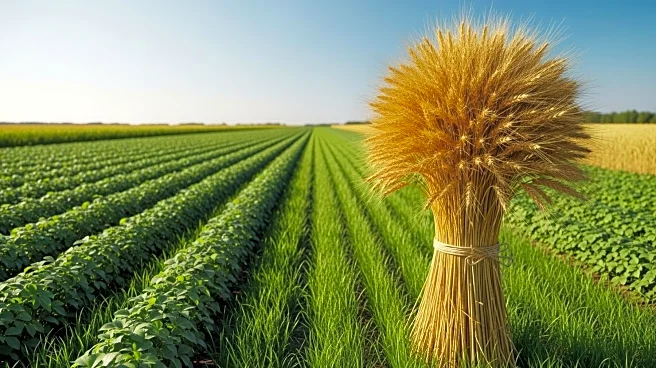What's Happening?
The U.S. Department of Agriculture (USDA) has initiated agricultural trade promotion programs for the fiscal year 2026. These programs aim to enhance export market access for U.S. agricultural products, reflecting a strategic move to bolster the country's agricultural sector. In addition to this, the Ag Startup Engine has introduced an Early Stage Cultivator Grant Program to support food and agriculture startups in advancing innovative ideas and solutions. Furthermore, the Iowa Department of Agriculture and Land Stewardship has awarded several grants to boost local food production and processing, including 15 Choose Iowa Dairy innovation grants and 33 Choose Iowa value-added grants. These initiatives are part of a broader effort to leverage connected agriculture technologies, such as IoT devices, sensors, drones, and data analytics, to improve farm operations and productivity.
Why It's Important?
These developments are significant as they represent a concerted effort to strengthen the U.S. agricultural sector's competitiveness in the global market. By enhancing export market access, the USDA aims to increase the international presence of U.S. agricultural products, potentially leading to increased revenue for American farmers and agribusinesses. The support for startups and local food production through grants is expected to foster innovation and sustainability within the industry, ensuring long-term growth and resilience. The integration of connected agriculture technologies is crucial for modernizing farming practices, improving resource management, and enabling precision farming, which can lead to higher yields and reduced environmental impact.
What's Next?
The USDA's trade promotion programs and the various grants awarded are likely to stimulate further investment and innovation in the agricultural sector. As these initiatives unfold, stakeholders can expect increased collaboration between government agencies, startups, and established agribusinesses. The focus on connected agriculture technologies will likely drive advancements in precision farming and resource management, setting the stage for a more sustainable and efficient agricultural industry. Additionally, the success of these programs could lead to further policy developments aimed at supporting the agricultural sector's growth and global competitiveness.
Beyond the Headlines
The push towards connected agriculture and the support for innovation in the sector may have broader implications for rural communities and the economy. By fostering technological advancements and supporting local food production, these initiatives could lead to job creation and economic development in rural areas. Moreover, the emphasis on sustainability and efficiency aligns with broader environmental goals, potentially contributing to efforts to combat climate change and reduce the agricultural sector's carbon footprint.









